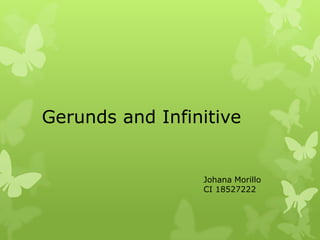
Gerund
- 1. Gerunds and Infinitive Johana Morillo CI 18527222
- 2. El gerundio y el infinitivo son formas de los verbos que actúan como nombres. El gerundio se forma con "-ing" (walking, eating, etc.). Como hemos visto en la lección sobre los verbos, el infinitivo se forma con la preposición "to" (to walk, to eat, etc.).
- 3. Reglas gramaticales para el uso del gerundio e infinitivo Cuando un verbo sigue a otro verbo, siempre necesitamos usar el infinitivo o el gerundio. Normalmente usamos el infinitivo después de algunos verbos y el gerundio después de otros. También hay verbos con los que podemos usar el gerundio o el infinitivo.
- 4. Examples -I can't afford to buy a new car. (No puede costearse un coche nuevo.) -He began to doubt himself./He began doubting himself. (Comenzó a dudar de sí mismo.) -They decided to move to Australia in May. (Decidieron mudarse a Australia en Mayo.) -I enjoy listening to music. (Disfruto escuchar música.) -She hates studying./She hates to study. (Odia estudiar.) -You love dancing./You love to dance. (Te encanta bailar.) -He needed to leave class early because he had an appointment. -Tenía que salir de la clase pronto porque tenía una cita.) -She can't tolerate complaining. (No puede tolerar quejas.) -I tried learning English. I tried to learn English (He intentado aprender inglés.) My mother could retire, but she keeps working (Mi madre podría jubilarse, pero sigue trabajando.)
- 5. Podemos usar el gerundio o el infinitivo como objeto, sujeto o complemento de una frase, pero en general, es mucho más común usar el gerundio como sujeto. Ejemplos: Objeto: -I like cooking./I like to cook. (Me gusta cocinar.) -She continued working./She continued to work. (Continuó trabajando.) Sujeto: -Swimming is good exercise. (Nadar es un buen ejercicio.) -Drinking and driving is dangerous. (Beber y conducir es peligroso.) Complemento: -The best thing to do when you are sick is to drink a lot of water. (Lo mejor que puedes hacer cuando estás enfermo es beber mucha agua.) -My favorite exercise is swimming. (Mi ejercicio favorito es la natación.)
- 6. Con algunos verbos, cuando usamos el gerundio o el infinitivo, el significado cambia. forget, mean, remember, stop... Ejemplos: Gerundio: -I forgot writing that email. (Me olvidé escribiendo ese correo electrónico.) Infinitivo: -I forgot to write that email.Play -I forgot to write that email. (Me olvidé de escribir el correo electrónico.) Gerundio: -Stop watching the television. (Dejar de ver las noticias.) Infinitivo: Stop to watch the news. (Parar para ver las noticias.)
- 7. Se usa el infinitivo después de adjetivos. disappointed, glad, happy, pleased, relieved, sad, surprised... Ejemplos: I'm glad to see you. (Me alegro de verte.) She was surprised to find the door unlocked. (Se sorprendió al encontrar la puerta abierta.) Después de preposiciones solo podemos usar el gerundio. about, against, at, after, before, by, on, without... Ejemplos: He's good at listening. (Escucha bien.) I always read before going to bed. (Siempre leo antes de acostarme.) You can't leave without saying goodbye. (No puedes salir sin despedirte.)
- 8. Se usa el gerundio después de unas expresiones o verbos frasales. to look forward to, to be worth, can't help, don't mind, feel like... Ejemplos -We're really looking forward to seeing you. (Tenemos muchas ganas de verte.) -That movie was not worth seeing. (No vale la pena ver esa película.) -I can't help falling in love. (No puedo evitar enamorarme Se usa el gerundio después de unas expresiones o verbos frasales. to look forward to, to be worth, can't help, don't mind, feel like... Ejemplos: -We're really looking forward to seeing you. (Tenemos muchas ganas de verte.) -I can't help falling in love. (No puedo evitar enamorarme